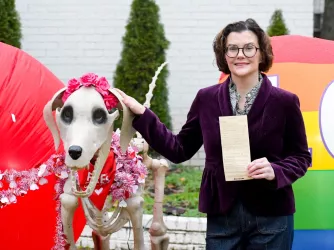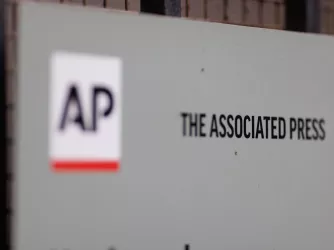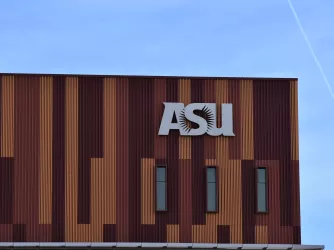Table of Contents
Bowdoin Censures Professor Who Dared to Report Negatively on College
Earlier this month I reported on FIRE's case at Bowdoin College, whose dean threw the book at an economics professor who dared to distribute a research paper that had conclusions that embarrassed the college. Had he not done so, his paper would not have been investigated at all, and the dean wouldn't have gone through every footnote looking for possible academic misconduct. All of the original charges, which included harassment and hostile work environment, failed to stick except for one "failure to cite" finding. This charge—that he failed to fully cite in one instance (in a document he self-published online and distributed in person) was considered serious enough for censure.
Economics professor Jonathan Goldstein, who has been at Bowdoin for 29 years, was interested in the amount that a college's academics appear to suffer as a result of emphasis on athletics. His research showed that among 36 colleges, Bowdoin came in last, meaning it had the greatest amount of lost academic potential. Goldstein was interested in what prospective students and their families thought about these results, and he distributed summaries of his paper to them while they were on campus and at admissions events.
Not only did the admissions folks not like this, but Dean for Academic Affairs Cristle Collins Judd quickly brought a slew of charges against him. An August 27, 2008, letter from Judd informed him that his distribution of the paper was being formally investigated "in the realm of harassment and hostile work environment, as well as the possible violation of other College policies." These allegations were to be investigated by Director of Human Resources Tama Spoerri. Judd also suggested that "issues" with Goldstein's "research methods ... may need to be considered by the appropriate faculty committee and my office."
Then, a few weeks later, Judd added new charges in the investigation: whether Goldstein failed to follow "the protocols outlined by the Research Oversight Committee" and whether he had revealed confidential information. Two weeks after that, Judd formally referred the research misconduct aspect of the investigation to an inquiry committee. Judd's allegations for the inquiry committee were described as "[f]ailure to cite sources" and "[p]lagiarism."
Almost all of these allegations were found to be meritless.
According to a letter to Goldstein from Judd on October 17, Spoerri's investigation cleared Goldstein of the harassment and hostile environment allegations. Instead, Spoerri found only that Goldstein had failed to treat colleagues "with respect and proper protocol." In addition, after Goldstein secured the assistance of an attorney, the Research Oversight Committee investigation into misuse of human subjects was simply dropped. Likewise, the allegations that Goldstein had improperly revealed confidential data apparently were dropped without further comment.
As for the remaining allegation of academic misconduct, an inquiry committee passed the allegation through to a second committee which, reporting earlier this month, threw out the part of the allegation involving plagiarism, leaving only the weaker "failure to cite" charge. The documentary record appears to show that Goldstein had every intention of fully citing the item in question. The second committee also resurrected the "confidential data" charge and, despite being unable to find intentional misconduct, found that Goldstein did incorporate confidential data into his paper. The question of intentionality is important because the Faculty Handbook exempts "honest error" from the definition of minor research misconduct such as "improper practice in ... reporting the results of [scholarly] research."
The dean thus far had been the judge of her own complaint, but on the recommendation of the second committee, she finally recused herself and left the punishment up to Bowdoin's president, Barry Mills. Goldstein also appealed to Mills, who denied the appeal and enacted a punishment of censure in the same letter, dated April 21, 2009.
In his six-page letter, Mills reviewed the whole situation, not limiting himself to the remaining academic misconduct charge, and even discoursed on the merits of the paper itself. Even though Goldstein had been cleared of wrongdoing for distributing his paper in public, Mills asserted that Goldstein should have observed an apparently unstated "limitation" on the "time, place, and manner" of distributing materials—namely at admissions information sessions. Mills also complained that Goldstein had "rudely attempted to undercut the credibility of a female student tour guide as she led parents and prospective students up the steps of the Moulton Union." He called Goldstein's actions "intimidating" and "bullying employees who had no way of protecting themselves."
Mills also claimed that by revealing the details of the case against him, Goldstein
intentionally violated the Faculty Handbook by disclosing many of the details of this matter to various organizations and to the press. In fact, the Bowdoin Orient reported that you went public with this matter in order to gain leverage over the College ("If everything remained confidential, the College basically has the power," [Goldstein] said, "particularly if things go to a litigation stage, since the College has deep pockets."). The Faculty Handbook is explicit in its requirement that all parties involved in the investigation should "strive to maintain confidentiality."
I hope Goldstein takes up this point with Bowdoin's faculty. I think the faculty might be surprised to learn that Bowdoin's president believes that the administration can charge a faculty member with an infraction and then ban the faculty member from discussing his or her own case. This is an easy recipe for abuse, scaring professors who are charged with infractions into keeping quiet on penalty of further punishment. We have seen this pattern all too often. When a faculty member believes he or she has been charged unjustly, it compounds the injustice when the faculty member is banned from seeking additional help from FIRE, the American Association of University Professors, or the faculty member's professional association.
In any case, for Mills, this is the bottom line:
These errors may not have been intentional, but you are responsible for more than simply making a mistake. In failing to cite your sources and to adhere to the confidentiality of the source, you are responsible for recklessly performing your research. ...
I believe the sanction recommended by the Investigative Committee should be afforded great respect because it was rendered by your faculty peers. Accordingly, I place this letter, along with a copy of the Investigative Committee's report, in your permanent file. As also recommended by the committee, you are hereby on notice that similar offenses in the future will yield more severe sanctions.
To be fair, Mills does have a point when it comes to the actual findings of academic misconduct: two committees agreed that the infractions were serious enough to consider prosecuting, unintentional though they apparently were. Indeed, when someone has committed an infraction and due process has been followed, an appropriate punishment is not unjust. (The issue of punishing unintentional error, however, remains.) And on the merits of the research, Mills adds, "You show me the facts and analysis that prove the depth of the problem you assert, and you will have a partner in me to remedy the situation. To date, I have yet to see the data that proves your point."
But it is important to remember that there is no way Goldstein's paper would have been investigated at all if it had not been so embarrassing to the college and had not been distributed to prospective students and their families. There is no way it would have received footnote-by-footnote scrutiny. As Goldstein has pointed out, even final versions of papers submitted to academic journals sometimes miss an important citation, and the remedy is not censure but a polite request to fill in the missing information. The result of all this investigative brouhaha is a chilling effect on faculty members who might want to publish results that are embarrassing to Bowdoin College.
Recent Articles
FIRE’s award-winning Newsdesk covers the free speech news you need to stay informed.

LAWSUIT: Tennessee town cites woman for using skeletons in holiday decorations

White House barring AP from press events violates the First Amendment

FIRE opposes Virginia’s proposed regulation of candidate deepfakes
